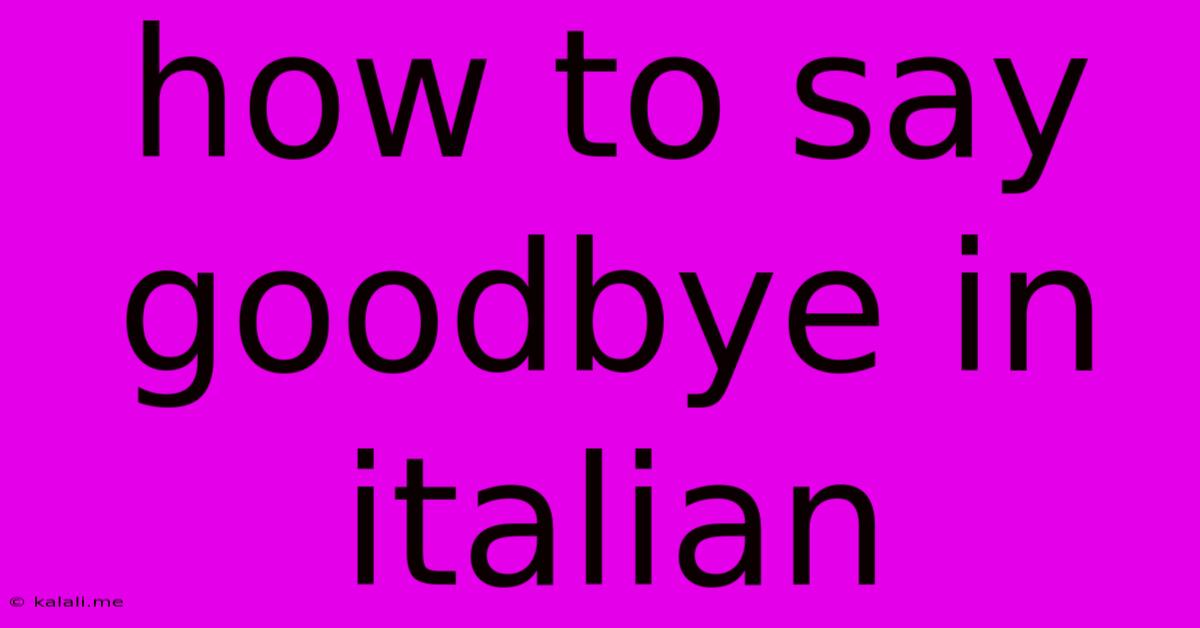How To Say Goodbye In Italian
Kalali
May 26, 2025 · 3 min read

Table of Contents
How to Say Goodbye in Italian: A Comprehensive Guide
Saying goodbye in Italian isn't as simple as just learning one phrase. The best way to say goodbye depends heavily on the context, your relationship with the person, and the time of day. This guide will equip you with a variety of Italian farewells, ensuring you're prepared for any situation. This article covers formal and informal options, along with nuanced expressions to elevate your Italian communication skills.
Understanding the Nuances of Italian Goodbyes: Just like in English, the way you say goodbye in Italian reflects the formality of the situation and your relationship with the person you're leaving. Using the wrong phrase can sound awkward or even rude. Mastering these nuances is key to sounding natural and confident in your Italian conversations.
Common Ways to Say Goodbye in Italian
Here are some of the most frequently used ways to say goodbye in Italian, categorized by formality:
Informal Goodbyes:
-
Ciao: This is the most common and versatile informal goodbye. It's suitable for friends, family, and colleagues you're on friendly terms with. You can use it at any time of day. It's the Italian equivalent of "hi" and "bye," making it incredibly flexible.
-
A dopo: This translates to "see you later" and is perfect for a casual farewell when you expect to see the person again soon.
-
Ci vediamo: Meaning "we'll see each other," this is another informal goodbye suitable for situations where you'll be seeing the person again shortly.
-
Baci: This means "kisses" and is a very affectionate farewell used among close friends and family.
Formal Goodbyes:
-
Arrivederci: This is the most formal way to say goodbye in Italian. It's appropriate for professional settings, or when speaking to someone you don't know well.
-
Buona giornata: Meaning "have a good day," this is a polite and formal farewell, suitable for daytime encounters.
-
Buona serata: Meaning "have a good evening," this is used in the evening and carries a similar level of formality to "Buona giornata."
-
Buona notte: Meaning "good night," this is used specifically when saying goodbye at night.
Beyond the Basics: Adding Depth to Your Farewells
To sound more natural and fluent, consider these additional expressions:
-
A presto: This means "see you soon" and conveys a sense of anticipation for the next meeting.
-
A più tardi: This translates to "see you later" and is a more specific version of "a dopo."
-
Un abbraccio: Meaning "a hug," this is an affectionate farewell appropriate for close friends and family.
Choosing the Right Goodbye: Context is Key
The key to mastering Italian goodbyes lies in understanding the context. Consider the following:
- Your Relationship: Are you saying goodbye to a close friend, a colleague, or a stranger?
- The Time of Day: Is it morning, afternoon, evening, or night?
- The Circumstances: Are you leaving for a short time or a long time?
By considering these factors, you can choose the most appropriate and natural-sounding goodbye in Italian.
Practicing Your Italian Goodbyes
The best way to master these phrases is through practice. Try incorporating them into your everyday conversations, even if you're just practicing with yourself. The more you use them, the more natural they will become. Remember to pay attention to the tone and inflection of your voice – this will further enhance your communication skills. Don't be afraid to experiment and find the expressions that best suit your personal style. With a little practice, you’ll be saying goodbye in Italian like a native in no time!
Latest Posts
Latest Posts
-
Can I Take Aerosol On A Plane
May 27, 2025
-
No Slip Condition Formula For The Derivative
May 27, 2025
-
How Long Is Cream Cheese Good For After Expiration Date
May 27, 2025
-
What Does It Mean When Someone Says
May 27, 2025
-
Another Word For A Blow Job
May 27, 2025
Related Post
Thank you for visiting our website which covers about How To Say Goodbye In Italian . We hope the information provided has been useful to you. Feel free to contact us if you have any questions or need further assistance. See you next time and don't miss to bookmark.